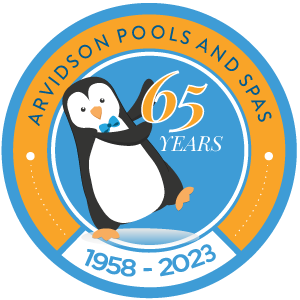Have a pool problem? Check out our list of swimming pool frequently asked questions. We are here to help!
My Pool Heater Is Cycling On and Off.
Try cleaning or backwashing the filter. Dirty or clogged filters can cause low flow, which will cause a heater to cycle off. If this doesn’t resolve the issue, then call us (815-459-0660) to schedule a service call to investigate and fix the problem.
My pool pump has lost prime, has low flow, or isn’t as strong as it used to be.
1. Make sure the water level in the pool is at normal level.
2. Make sure the skimmer baskets are empty.
3. Make sure that the valves in front of the pump are open.
4. Verify the pump basket is clean and in tact with no cracks. If a basket is cracked, debris may have clogged the impeller inside the pump.
5. If there are constant air bubbles returning to the pool, verify that the lid o-ring is not cracked or brittle. Also check the lid and strainer pot for hairline cracks and re-tighten any flexible hose clamps if present.
If none of the above items is the cause of the problem, please call us at 815-459-0660 to schedule a service call.
How do I circulate my pool?
Pool water must be circulated for maximum sanitizer effectiveness. The more your water is in motion, the harder it is for bacteria and algae to take hold. Debris is captured by your filter, too. The best time to circulate the water is during the day, for 10 hours or more.
What is filtration?
The filter is one of your most important pieces of equipment. It removes both visible debris and most microscopic matter. Generally, a filter should be backwashed (the removal of material trapped on or in the filter media) when the water pressure in the filter reaches 8 to 10 psi above normal. (Check manufacturer’s guidelines.) Because backwashing does not remove oils and deeply embedded debris, every filter needs to be chemically cleaned regularly. Your BioGuard Dealer can help you establish a filter maintenance program.
How often should I clean my pool?
Some swimming pools have areas with little or no circulation. This is where algae and bacteria can begin to grow. At least once a week, the walls and floor should be brushed and vacuumed to remove debris that the filter misses. Brushing is a must, even if you use an automatic pool cleaner or retain a weekly service.
What is water testing?
Every pool has characteristics that must be regularly measured and adjusted. Most important are the pH and the level of active sanitizer. By testing these two factors at regular intervals, you’ll understand how bather load, weather and product application affect the water. Test your pool water two or three times per week. Also, take a sample to your BioGuard Dealer when you open and close your pool, and every four to six weeks during the season. This will help you maintain proper water balance and greatly reduce the potential for problems.
What do I do with all of these chemicals?
The last step in a total pool maintenance program is applying the right products to your pool water at the right time. This will help you:
- Provide a sanitary swimming environment.
- Balance the water to protect the equipment and pool surfaces. Unbalanced water can permanently damage both.
- Provide brilliant, sparkling water that’s inviting.















